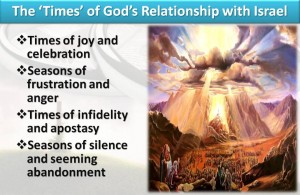[First posted December 9, 2014:
Continuing the discussion on world religions, specifically monotheisms that trace their roots to Abrahamic faith, this is from chapter 6 of MUST READ/MUST OWN Who are the REAL Chosen People? – by Reuven Firestone. The chapter’s title: Chosenness and Covenant in Rabbinic Literature. Reformatted and highlighted for this post.—Admin1]
The claim for continuity
As mentioned previously, rabbinic Judaism represents a new expression of biblical religion, but unlike either Christianity or Islam, it never claimed that status. Its position, rather, was that it was biblical religion , but with some adjustments after the Roman destruction of its Temple in Jerusalem, and therefore, the forced termination of its ancient mode of worshiping God through animal sacrifice. Rather than claim a new dispensation as did Christianity, or a correction of the errors of the old as did Islam, rabbinic Judaism claimed continuity with the original and authentic monotheism represented by Abraham and the biblical patriarchs, Moses at Mount Sinai, David and Solomon, who built up Jerusalem and established God’s Temple there, and the great prophets of Israel.
Judaism, therefore, was not static but continued to evolve, and its evolution included the emergence of a body of literature in the Talmud that was so deeply linked with the scripture of the Bible that it developed a scriptural status itself. The emergence of the Talmud took centuries. Its earliest parts date from a century or more before Jesus, and its end-date was in the period shortly before the Arab Muslim conquest of the seventh century. The Talmud is so thoroughly integrated with the Hebrew Bible that the biblical subtext of any passage is usually included as part of the text itself. This can be observed quite clearly in the passages that treat chosenness.
The following section from the Talmud (Avodah Zarah 2a-b) is fully caught up in the argument over who best merits God’s love for living out the divine will, and who best merits God’s reward for doing so:
In times to come the Holy One will bring a Torah scroll, embrace it to His chest and say,“Whoever has been occupied with this come forth and receive its reward!“ Immediately, all the idolaters will gather together in confusion, as it is said (Isaiah 43:9), All the nations gathered together. The Holy One will say to hem, “Do not gather before Me in confusion. Let each nation enter separately with its scribes, as it is said (in the continuation of Isaiah 43:9), and let the peoples be gathered together. . . The Holy One will say to [the Romans who come first], “How have you been occupying yourselves?” They will answer, “Lord of the Universe, we have established many marketplaces, we have built many baths, we have accumulated much gold and silver. We did this only [to support the Jews] so that they could devote themselves to the study of Torah.” The Holy One will reply, “You fools! All that you did was only for your own sake. You have established marketplaces to provide whores, baths to revel with them, and as for the silver and gold, it is Mine, as it is written (Hag. 2:8), The silver and the gold are Mine, says the Lord of Hosts.
Then the Persians step forward and make the case for carrying out God’s design by supporting the Jews so that they can live out God’s will. But they, too, are chastised for being selfish and thinking only of themselves. All the nations do likewise and all are invalidated for not personally taking responsibility for engaging in Torah as did the Jews. The nations then argue a different position to God. “But [the Gentiles] will argue, ‘How can You blame us for not carrying out the Torah when we never agreed to accept it?’ The response that follows is, ‘Then why did you not accept it?’”
The passage then goes on to state that the other nations took on the responsibility to observe a much reduced version of the Torah that the Talmud refers to as “the Seven Commandments given to Noah,” but even these they failed to obey. The chosen status of the Jews is thus proven through the invalidation of all other communities.
This is an interesting passage for a number of reasons.
- First, it serves as a consolation to the Jews, who had suffered the destruction of the Temple, dispersion into exile, and insult and mistreatment after the ascendance of Christianity. How could they continue to see themselves as God’s favored people when they are in such straits and their competitors the Christians seem to bask in the light of God after the Christianization of the Roman Empire in the fourth century?
- Christianity is not openly condemned in this passage, but it was dangerous for a despised and powerless minority to criticize the religion of the empire. Rome, therefore, became a code word for “Christianity” in rabbinic literature because the Roman Empire did Christianize.
- It should also be noted that after Christianity became the religion of the empire, Jews had to self-censure their criticism of Christians to protect themselves.
Chosenness as Consolation
Many Talmudic passages that treat Israel’s chosenness are forms of consolation. The following coveys two reassuring messages about the important role of the Jews for the world’s well-being:
- Resh Lakish said, Why is there an additional letter “hey” in It was evening and then morning, the sixth day (Gen. 1:31)? This teaches that the Holy One stipulated with works of Creation by saying to them, “If Israel accepts the Torah, you will exist, but if not I will turn you back into emptiness and formlessness.” (Shabbat 88a)
The first message is to the Jews—
- and it tells them to hold fast to their religion, despite their humiliation,
- for God is willing to keep the world in existence only on account of Israel’s loyalty to God
- through observing the Torah.
- That is to say, Israel is still God’s chosen despite the Jews’ current degradation.
The second message is directed to the entire world, including those who are in superior political and social position to the Jews. That message asserts that the very existence of those who degrade the Jews is ironically dependent upon the Jews whom they despise.
Of course, that audience is not reading this text anyway, so the message is really directed internally. It provides Jews hope for a day in which God will redeem them from their unhappy state.
It should be noted that rabbinic literature in the Talmud and related literatures is a large collection of tradition. Various positions and opinions are presented in ways that are not intended to be absolutely consistent, so anyone reading through the material will observe differing positions and many issues and variant interpretations of biblical verses.
In one series of biblical interpretations, it is maintained that God loves Israel even more than God loves the divine angels. A rabbinic midrash (exposition) from the eighth century cities many cases from the Bible where the same word refers to Israel and to God’s angels. With poetic symmetry, the work sets out to prove that the ways in which those words are used shows that God loves his chosen people Israel more than his angelic servants:
Israel is called “servants,” as it is said, For to Me Israel are servants (Lev. 25:55), and the ministering angels are called servants, as it is said, And if He cannot trust His own servants (and casts reproach on his angels) (Job 4:18). How do you know who is more beloved? [God] says, They are my servants whom I freed from the land of Egypt (Lev. 25:55). Israel, you are more beloved to Me than the ministering angels.
Israel is called “children,” as it is said, You are children of the Lord your God (Deut. 14:1), and the ministering angels are called “children,” as it is said, The children of divined beings came to God (Job 1:6). How do you know who is more beloved? [God] says, Israel is My firstborn son (Exod. 4:22). Israel, you are more beloved to Me than the ministering angels.
Israel is called “kings” …and ministering angels are called “kings” …Israel, you are more honored by Me than the ministering angels.
Israel is called “hosts” and the ministering angels are called “host”…Israel, you are greater to Me than the ministering angels.
Israel is called “holy” and the ministering angels are called “holy” …Israel, you are more holy to Me than the ministering angels.
This exegesis sets out to show how God could not possibly have stopped loving Israel. Israel is more beloved to God even than the ministering angels, thus showing God’s love for the Jews as unique and everlasting. This consolation takes on particular meaning as we observe how the positions of Jews and Christians were reversed in the fourth century. Judaism had been favored by the pagan Roman Empire early on, while Christianity was brutally persecuted. Subsequently, both Jews and Christians represented threats to the empire and both were persecuted. But when the empire Christianized, the tables were completely turned. With that change, Christianity represented the establishment religion, after which Judaism was depicted by Christians as a despised religion.
Rabbi Elazar Ben Azaria … said, You have affirmed this day that the Lord is your God … and the Lord had affirmed this day that you are, as He promised you, His treasured people (Deut. 26:17-18). The Holy One said to Israel, “You have made Me the sole object of your love, as it is written, Hear O Israel, the Lord our God is One (Deut. 6:4). And I will make you the sole object of love, as it is said, Who is like Your people, Israel, a unique nation on earth (1 Chron. 17:21). (Talmud, Hag. 3a-b)
In the rabbinic model, therefore, despite the profound decline of the Jews with the destruction of the beloved Jerusalem Temple and their persecution by the pagan Roman Empire, their institutionalized discrimination by the Christianized Roman Empire of Byzantium, and the dispersion of Jews throughout the Mediterranean world and beyond, God never rejected His “chosen people.”
The Jews never lost their exceptional status. Although they may continue to suffer, their suffering is a suffering of love (yisurey ahavah) that would end in some unknown future when the true messiah will come to redeem Israel, and through that redemption, redeem the entire world.



Reader Comments